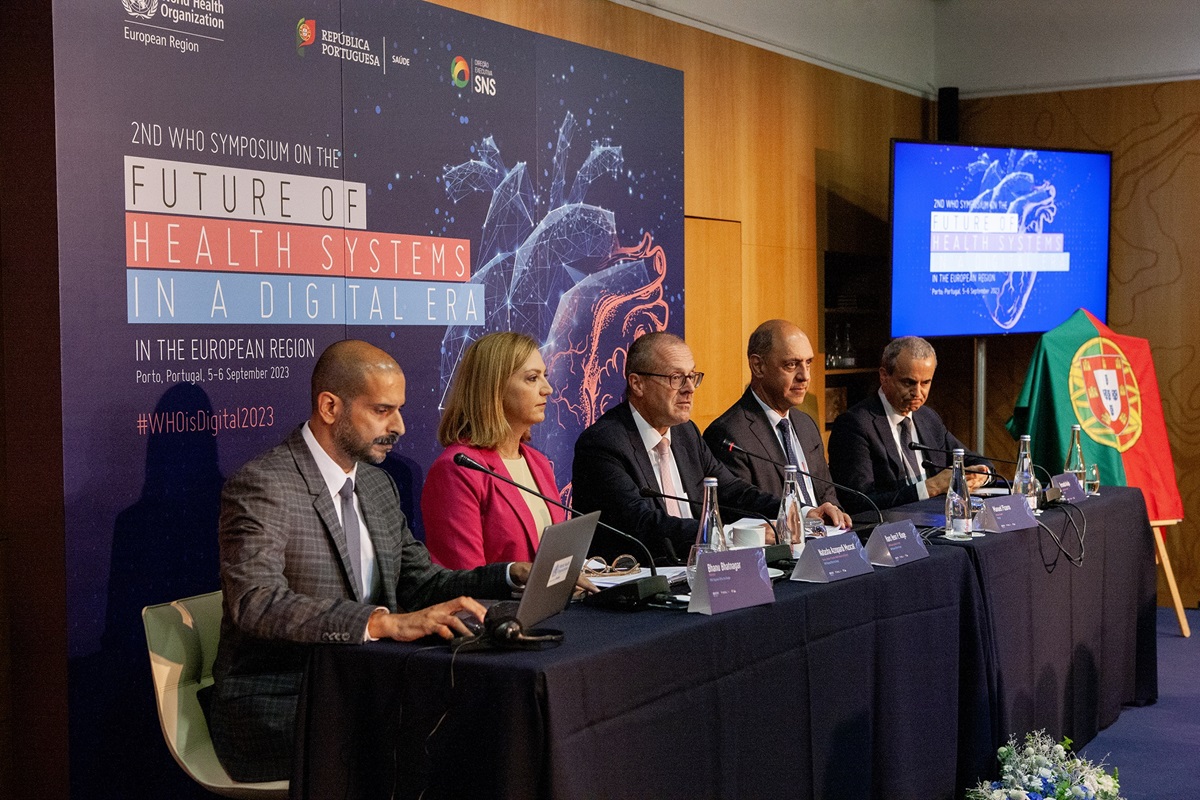No images? Click here
International Day of Clean Air for blue skies: Stronger partnerships, more investments and shared responsibility needed to tackle air pollution
07-09-2023
Air pollution is responsible for half a million premature deaths annually in the WHO European Region, primarily due to noncommunicable diseases, such as ischaemic heart disease, stroke, lung cancer and chronic obstructive pulmonary disease. On this International Day of Clean Air for blue skies, 7 September, WHO/Europe is calling to step up action "together for clean air", highlighting the urgent need for stronger partnerships, increased investment, and shared responsibility for overcoming air pollution. For 2019, 569 000 premature deaths can be attributed to ambient air pollution, and 154 000 deaths to household air pollution in the Region. Air pollution is transboundary both in its impacts and the responses needed to tackle it. It is the contamination of the air we breathe, indoors or outdoors, by any chemical, physical or biological agent that is potentially threatening to human and ecosystem health. It is also essentially a man-made health burden, as the primary sources of pollution include the energy sector, transport sector, domestic cooking and heating, waste burning, industrial activities and agriculture, and, increasingly, wildfires during the summer.
73rd session of the WHO Regional Committee for Europe
24–26 October 2023, Astana, Kazakhstan
In 2023, WHO marks its 75th anniversary, 45 years since the signing of the historic Alma-Ata Declaration on primary health care (PHC), and the mid-point of the European Programme of Work (EPW) 2020–2025 – “United Action for Better Health in Europe”. RC73 will therefore be an opportunity for delegates to reflect on the current state of health and well-being across the Region, take stock of progress in delivering the EPW, celebrate public health milestones over the past 75 years, and discuss what is needed to address current and future challenges.
MPOX (MONKEYPOX) OUTBREAK
Mpox Q&A: What you need to know about mpox
COVID-19
Increasing Recognition, Research and Rehabilitation for Post COVID-19 Condition (long COVID)
WHO remains committed to learning more about long COVID and to finding ways to improve the medium- and long-term outcomes for people affected by it.
Partnering with the European Union to support deployment of COVID-19 vaccines and vaccination
The EU and WHO/Europe together provide critical assistance to Member States of the WHO European Region to ensure local readiness for safe and effective vaccination campaigns against COVID-19
Publications and technical guidance
Publications, country and technical guidance for the COVID-19 outbreak
UKRAINE EMERGENCY
Ukraine: staying the course on universal health coverage amidst war
06-09-2023
WHO infection prevention and control minimum requirements adopted at national level in Ukraine
23-08-2023
Strengthening Ukraine’s AMR surveillance with WHO support
22-08-2023
TÜRKIYE AND SYRIA EARTHQUAKES
Empowering local communities in the aftermath of the earthquake in Hatay, Türkiye
25-08-2023
Video: Exceptional people responding to the Türkiye earthquakes

05-09-2023
The adoption of digital solutions in health care has increased across the WHO European Region in recent years, changing the way patients receive care at primary care facilities, hospitals and their homes. Digital solutions are transforming the way health-care professionals diagnose and treat conditions ranging from cancer to diabetes and mental health. Now, countries need to step up investments in digital health technologies and platforms to expand access to digital health for all.
A new report, “Digital health in the European Region: the ongoing journey to commitment and transformation”, being launched today in Porto, Portugal, at the Second WHO Symposium on the Future of Health Systems in a Digital Era in the European Region, covers all 53 Member States of the Region. While in many countries the COVID-19 pandemic accelerated the creation and use of digital health tools and policies in response to lockdowns and social distancing, including telemedicine and user-friendly health apps, the report underscores that there is still much work to be done. .
Shaking up the status quo that separates different approaches to medicine and health
21-08-2023
The kindness of strangers
19-08-2023
New “how to” guide for applying behavioural and cultural insights
18-08-2023
Unity in diversity is the very ethos of traditional, complementary and integrative medicine
18-08-2023
Sevgi's journey of hope propelled by traditional, complementary and integrative medicine
17-08-2023

05-09-2023
I’d like to start by thanking our generous hosts, the Government of the Republic of Portugal, and in particular the Ministry of Health and my friend, the Health Minister, Dr Manuel Pizarro, as well as Professor Fernando Araujo, the Executive Director of the National Health Service. As a leader and early adopter of digital health tools and interventions, Portugal was the natural choice to co-host this Second WHO Symposium on the Future of Digital Health Systems in the European Region.
I’m also pleased to announce we have just signed a letter of intent with the Portuguese Government, to open a new WHO Country Office right here in Porto. Among other things, the new office will be tasked with a special project on health technology and entrepreneurship. I’m sure my Portuguese counterparts will say more on this in a moment.

08-09-2023
On 8 September, 2 days before World Suicide Prevention Day, over 30 000 students from 121 schools in Sweden will dance in a collective show of unity against suicide, one of the most pervasive public health problems among young people in the WHO European Region. The event, called “Dance for Life” (Dansa för livet in Swedish), has a simple but powerful premise: at the start of the school year, all new students take a break from classes to participate in a schoolwide choreographed dance. “The aim is to prevent mental ill health among young people, reduce the number of suicides, and break the stigma of talking about mental illness,” says Erik Allard, one of the project’s organizers.
Providing health care at -45° C: Tajikistan’s heroes of the world’s highest plateau
11-09-2023
Caring for the youngest
07-09-2023
Salma’s path to recovery: Dealing with cancer postpartum
05-09-2023
Healing amidst adversity in a refugee and migrant camp in Greece
05-09-2023
From conflict to care: Natalia’s story
04-09-2023
Mohamed’s hopes for recovery in Schisto refugee camp, Athens, Greece
04-09-2023
Ukraine’s first infection prevention and control centre opens with WHO support
18-08-2023
Norway’s ongoing journey to optimize breastfeeding support
17-08-2023

EVENTS
Eliminating mpox: Placing affected populations at the heart of our response
17 May – 30 September 2023
12th HEPA Europe conference: “Implementing health-enhancing physical activity research: from science to policy and practice”
11 – 13 September 2023, Leuven, Belgium
WHO regional meeting on behavioural and cultural insights for health
12 – 14 September 2023 Copenhagen, Denmark
Research-to-policy conference on population-level impact of alcohol control policies in the EU
13 – 14 September 2023 Barcelona, Spain








